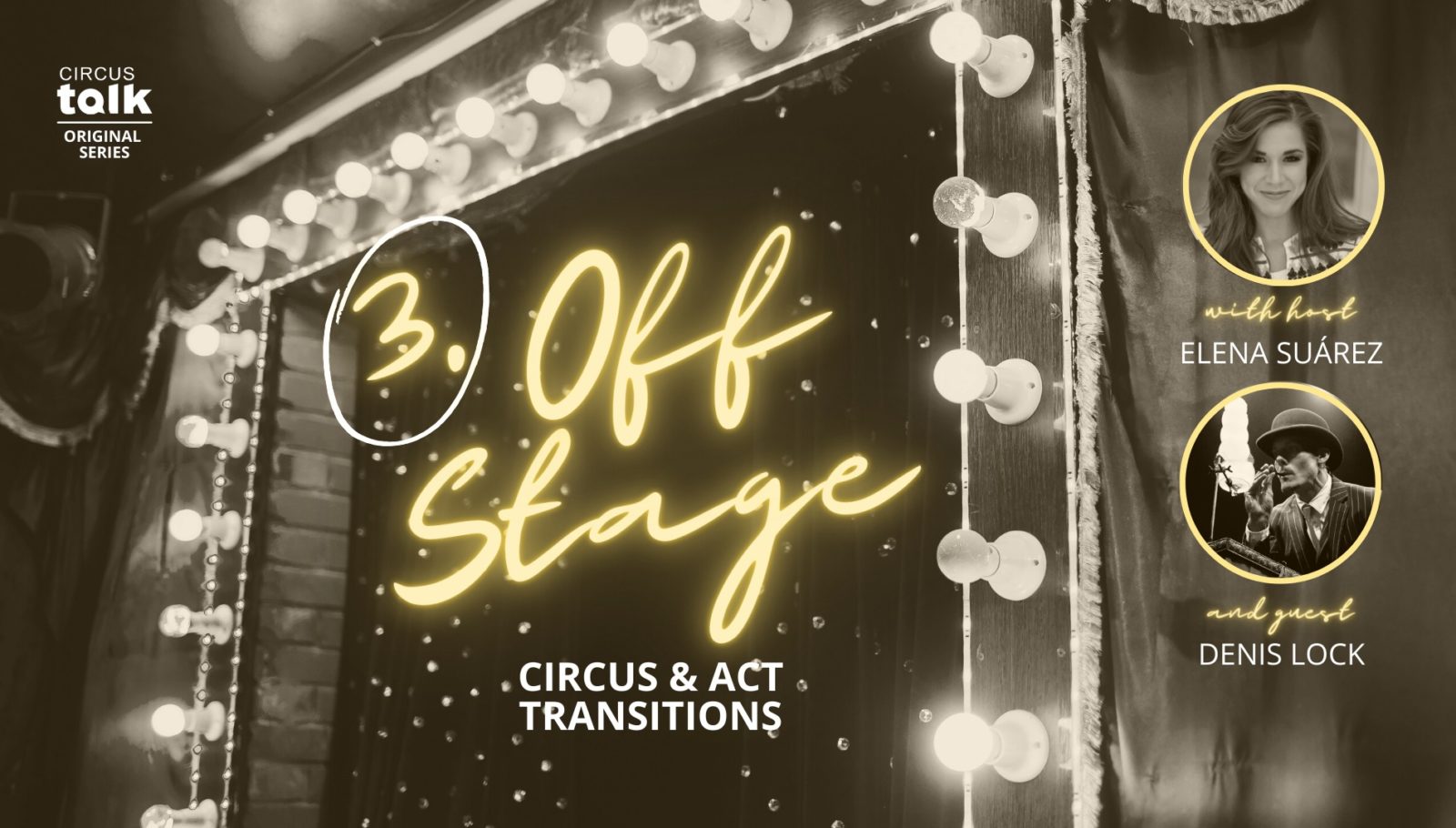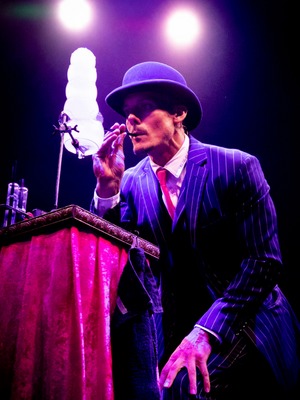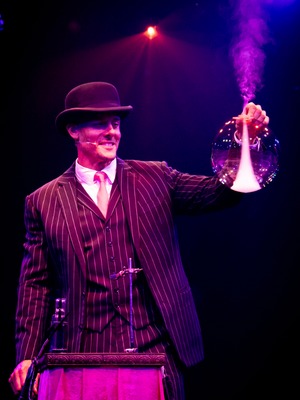Off Stage: Circus and Act Transitions with Denis Lock

“Off Stage” is a 3-part, written series for the circus performer pursuing interests outside of the performing arts, or “off stage.” Our host and author for the series is performer, choreographer, and writerElena Suárez Pariente. The series presents three interviews between Elena and her guests as they offer personal stories and advice on pursuing passions parallel to circus performance. The topics here include pursuing a degree, starting and running a business, and turning a hobby into a lucrative side job.
In this final segment of CircusTalk’s Original Series, “Off Stage,” I’ll be talking about a topic that’s a little different from the first two, but equally important and demanding. Funnily enough, I’ll be exploring “on stage” transitions, the development of new acts while performing the main discipline in parallel, and taking risks within this transition. Let me introduce to you my next guest, Denis Lock, better known as “the bubble man.”

If you’ve seen Opium in Las Vegas within the past few years, you probably know who he is. Denis’s bubble act is unique and brilliant – it suspends reality and teleports you to a place where everything is possible for just a few minutes. Denis is a master in the art of creating bubbles in a variety of fantastic shapes. It’s a skill that involves scientific knowledge, technique, a lot of hours of research and, as he explains, “a lot of trial and error.” In a beautiful origin story, Denis crafted this new skill simply to be closer to his daughter. He wanted to make sure she would remember him in a beautiful way, and discovered this passion by trying to bring happiness to someone else.
But of course, the bubbles haven’t always been a part of his artistic career. Previously, Denis was an acrobat, having a successful career as a hand to hand circus artist. When he was twelve years old, he started gymnastics and later went to the National Institute of Circus Arts in Australia, where he learned different disciplines, including Russian swing, Chinese pole, handstand, tap dance, and hoop diving. From 2005 until 2018, he performed a duo hand to hand with Hamish McCann, and together they were “The English Gents.” Before they started their duo, Denis was always the flyer, but when they met each other working in Tokyo Disney, Hamish asked him to be his base. Since then, they have performed around the world in shows like La Clique in New York, La Soirée, and Absinthe in Las Vegas. During those years they also did street performances and became known for their fully suited, distinguished style. Most recently, their current employer, Spiegelworld, separated the duo, keeping Hamish in Absinthe to perform his pole act and transferring Denis to Opium to perform his Bubbles act.
Still, you’re probably wondering how this stark on-stage transition came to be. In 2005, Denis’ humble bubble beginnings started while he was playing piano for the original “bubble man,” Tom Noddy, in Absinthe. He’d always thought it was an interesting skill, although he didn’t get into the bubble world until one day, his one-year-old daughter hit her head and the first thing he thought to do to make her feel better was to create bubbles. He was amazed at how a bubble, such a simple thing, could stop her from crying and bring her such pure happiness. After this pivotal moment, he had to return to living on tour while his family stayed in Japan.
Denis (D): I was worried that she wasn’t gonna know who I was as she grew up, or that we’d have no connection. And I thought what I’d do is I would learn some bubbles. She really liked bubbles. I’d learned some bubbles, because I’d seen Tom do it before, and then after the end of the tour, I would bring them back to Japan, and I would show her these bubbles. She would see the bubbles and anchor all those good memories with me, and she would remember, okay, her dad is that guy that did the beautiful bubble thing. And then we would have a connection.
From that moment on, the bubble journey continued…
D: I was missing her a lot, and it was difficult, so I kind of channeled all of that emotion, I suppose, into the bubbles, and I became completely obsessed with them. I’m a bit of a science nerd, so I got into the science of the bubbles and the chemistry and physics of them. I developed a bunch of tricks, and I learned a bunch of tricks that Tom had done before. So, I mean, I just taught myself them, but Tom had done them.
Elena (E): Did you learn directly from him?
D: No, I just taught myself. I just did it, just trying and failing.
E: How did this new passion go from being a hobby to an act that you now perform every day?
D: After so many hours of researching and creating, I realized that I just loved it, and that it was not only for my daughter, but for me, too. I became obsessed. I was practicing them all the time, and other people in the cast started to realize what I was doing. I’d be in my hotel bathroom, in the middle of North Sweden at, like, three in the morning, just making bubbles. My friends were coming to my room to see the bubbles and they loved it. Everyone loved it. So I thought, I’ve got something here.
E: When did you decide that this was your new skill?
D: I’m not sure. Since maybe 2007. I became very interested in science. I was a terrible student at school. I performed very poorly academically. I was too busy being naughty, but from about 2007 or 2008, I kind of grew up a bit, and I started to become really interested in stuff, I just got very curious. I just really enjoy learning about different things, I guess. I got very into it and that’s how I grew into my new skill of creating bubbles.
E: During your career, you took some risks. Was it scary to change from an act that you were doing for a long time to a completely new thing?
D: I did it at the same time that I was doing hand to hand, so it wasn’t a big risk. It was just an extra on top of that. And I was doing it in the same show, so the hand to hand number was always the main act I did. It wasn’t until I joined Absinthe and they moved me to Opium that I stopped doing the hand to hand act.
E: How do you feel about that?
D: I mean, physically it’s a lot easier, because to be a base it takes a lot. Also, there are certain things about working alone that are a lot easier because you don’t have to answer to anyone, you can just do it yourself. When I moved to Opium, I thought that was kind of the end of my career, to be honest. I have other interests outside the circus. I wanted to pursue farming and be closer to my family. I don’t know, circus was just something that I kind of did professionally for money, because I couldn’t do anything else. I was just lucky that I had that gymnastics training that led into the circus, because I didn’t do well academically. I don’t know what I’d be doing if I didn’t have that. It was the only option to go out from where I grew up. And I don’t believe in fate or anything, but everything just fell into place so easily with bubbles.
E: Your act is very unique. Everyone that sees the show says, “I never saw this in my life.” How do you feel if other artists try to copy what you develop with so much effort and time?
D: Well, it’s clear that a few people have been copying me. I’m not on social media, so I don’t know if it’s just, if someone shows me something. I mean, I don’t own bubbles; bubbles are bubbles. Bubbles are for everyone. If someone wants to do bubbles, then all the power to them. If it makes people happy, then that’s great. If people copy me and it dilutes it to a point where I can’t work anymore, that’s just the way it is. I mean, I’ll do something else. I would hope that people develop their own stuff. If they’re inspired by something I’ve done, then I’m flattered. It’s like Tom Noddy: I was inspired by him, and he was inspired by other people.
E: What are your goals with bubbles?
D: I haven’t really thought about it, to be honest. If something I’ve done could spread any kind of happiness outside of what I’m showing, if other people do it and spread it on, that’s great. I would be honored.
Denis, as he mentioned, is also very passionate about interests outside of the circus world. It’s inspiring to hear how someone who didn’t have great academic results can become a wise person pushed by curiosity and the willingness to learn about everything. “Usually I will be spending every moment of my spare time doing that; it’s just a pursuit of happiness. I just find things really interesting. I’ve gotten really interested at the moment about mechanics. I’m just fascinated by how things work mechanically. After that, it might be botanicals, or I’ll be learning about plants, or, I don’t know, soil microbiology or literature. I just get these phases of interest that I just want to pursue, just because it’s interesting,” he added.
To close out this interview and wonderful series, if there were to be a few takeaways from what insights our guests offered, they would be that 1. Inspiration comes from unexpected places – a lot of the time from outside the circus world. 2. Finding what makes you curious is a good place to start when considering an additional passion on or off stage. 3. Any goal you have is within reach with the right mindset and hard work. Failure is just an opportunity to learn.
Thank you for joining me, Elena Suárez Pariente, for this Exclusive Original Series, “Off Stage.” Read the first two parts of this three-part, written series with CircusTalk PRO.
All images taken by Sebastien Theve @sebtheve
Editor's Note: At StageLync, an international platform for the performing arts, we celebrate the diversity of our writers' backgrounds. We recognize and support their choice to use either American or British English in their articles, respecting their individual preferences and origins. This policy allows us to embrace a wide range of linguistic expressions, enriching our content and reflecting the global nature of our community.
🎧 Join us on the StageLync Podcast for inspiring stories from the world of performing arts! Tune in to hear from the creative minds who bring magic to life, both onstage and behind the scenes. 🎙️ 👉 Listen now!




